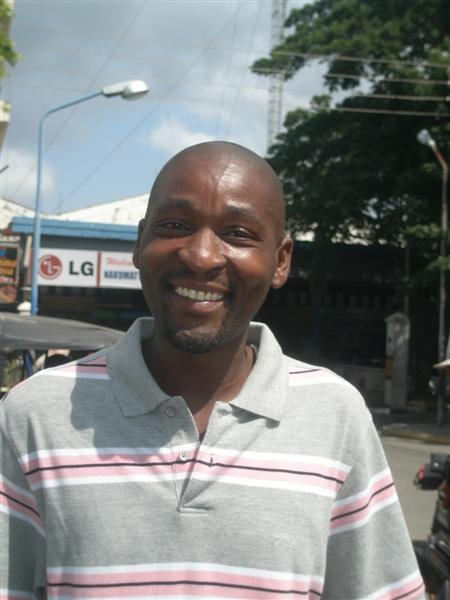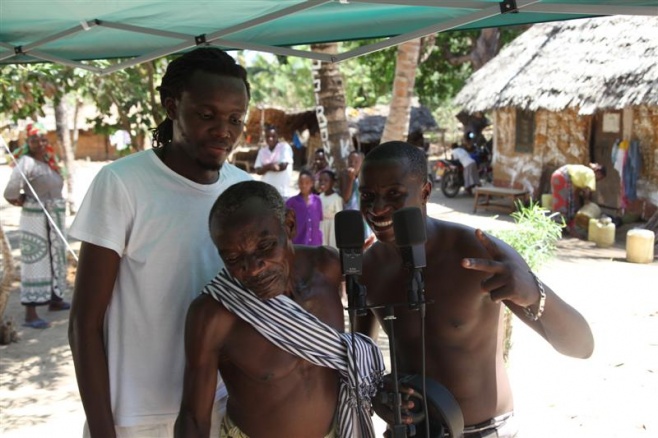This is the penultimate report back from the March Pilot. Our goal here is to review the project against our objectives and discuss lessons learned. Our final report will be a bit more fun, giving our high lights, low lights and some final pictures.
1. What were the original objectives for the pilot? We had three primary objectives for this trip:
- Test the Equipment: we had tested our mobile recording equipment in Campo Limpo Sao Paolo, but we had been in a city relying on city power. In Kenya, we would be truly in the field, without power, with dirt/dust, with the constant threat of storms, with concerns about theft, etc…
- Test the Team: We would be training the Ketebul team on the new equipment and we would be seeing how we all did in the field in terms of logistics and audio and video capture.
- Test the Concept: Singing Wells is about the archiving of traditional East African music and ensuring that these traditions are kept alive in contemporary music. We needed to see if this was a worthwhile concept.
2. And, how did you do against these objectives? There were a lot of lessons learned, but the bottom line is we all walked away very excited about Singing Wells and feel we’ve accomplished everything and more in the pilot:
- The Equipment: The mobile recording studios performed flawlessly and the sound we captured is truly extraordinary. We played back the songs to everyone that would listen and to a person people were amazed at the quality of the recordings. There’s the odd cow, or screams of kids raising around the village, but goodness -that is what this is all about. We used a generator throughout and easily isolated it so no noise leaked on to the recordings. We also used three separate video recorders and all performed well.
- The Team: The Ketebul team were amazing and Andy did a great job of training folks quickly. The three sound engineers are all very experienced in the studio and quickly got up to speed with outside recording and the new equipment (hard ware and software). Pato and Winyo did a great job on video and photography and we realised how important the visual archiving will be for the project. Finally, Deche, who was in charge of logistics was absolutely brilliant and found 8 great teams, four great villages and demonstrated how well we could run the full project. A big thank you to Deche:

Our man on the ground in Malindi and Diani.
- The Concept: And most important of all, we proved that we are on to something very big here. First, there is an urgent need for what we are doing: the average age of the performers was about 60 and there were NO young adults or kids involved. This music, these traditions are dying fast. Moreover, on three different cases local young men from the villages approached us and said they also had some music for us to hear. In each case they were trying to imitate US artists from 50 Cent to Justin Timberlake. In no case did they build off their own musical traditions even though each of them was proud of their parents’/grandparents’ performances. They just didn’t link these traditions to their own music. Second, we showed the power of bringing a contemporary artists into the villages and working on ‘fusion’, the blending of new music with musical traditions. Winyo performed in three villages and in each one the local groups worked with him effortlessly turning the resulting songs into something very special. And the highlight was when Winyo, Bado and his father took a Bado composition (yes, sounding like any American group) and turned it into something truly amazing by combining the best of old and new.

The Magic Moment on Day 1 when it all seemed worth it. We took a simple (very American sounding song) from Bado and blended it with his Dad's styles to make something really special
3. And Lessons? What Need to Improve? We were glad we did the pilot because we did learn a lot. Here are the main lessons:
- Far more time on Visuals: We had under-estimated how beautiful the locations would be and how ‘picture perfect’ the performances would be. We had only two video folks (Jimmy and Pato) and not enough good equipment. So, we’ll fund raise for a major upgrade on the equipment and bring at least one other person for November.
- Far more time on Fusion: The Singing Wells concepts works brilliantly. We can really bring these traditions alive. We did not spend enough time, though, in the villages, letting contemporary artists work on jointly created music. When we did, on days 1 and 3, the results were great. So we’ll bring more Ketebul artists to the field and will spend more time on new material.
- Be Far Clearer on Output and ‘The Throat to Choke’ for each: We all worked on recording, both audio and visual and we captured a huge amount. Be we weren’t clear enough on output or who’s in charge of its development and archiving. This is easily fixable and we already agreed on what we are delivering (See Below)
4. So what are your immediate next steps? We still need to finish the pilot phase and that is to deliver on the following:
- A CD: we have about 25 songs and will produce a CD of the 8 groups
- A DVD: we will also produce a DVD of the performances and a ‘making of’ documentary
- Influence Series 1: We agreed to start an ‘influences series’ where artists will write a song inspired by Singing Wells and describe their influences. Winyo will start as he was with us the full time and is already passionate about describing who’s inspired him.
- Sounds library: We have the beginning of a wonderful sounds library to help producers access different instruments and loops. We will start to build this now.
- Full Archive: We will, of course, achrive all performances including all the wonderful interviews we completed with the performers.
5. And longer term? Well, the long term starts now. We need now to work on the following:
- Training: We need training on professional archiving and will work with professionals and enthno-musicologists to work on this.
- Recruitment: we believe a key benefit of Singing Wells is to train others on field recording and project like this. We want to recruit a set of new folks that want to learn and take on similar projects.
- Fund Raising: We need funds to complete the pilot output and the November project. We are very confident that this project will be hugely appealing to NGO’s, Corporate sponsors and individuals who want to share what is truly a once in a lifetime experience.
That’s it for now. Of course, there is far more we will be doing and we’ll update all of you on this website. Our final blog will be all about the highlights, low lights and photos. Lots of photos. Thanks for sticking with us throughout all this.
Jimmy
